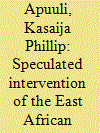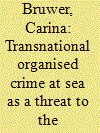|
|
|
Sort Order |
|
|
|
Items / Page
|
|
|
|
|
|
|
| Srl | Item |
| 1 |
ID:
172095


|
|
|
|
|
| Summary/Abstract |
The post-Cold-War collapse of the Soviet military-industrial complex has enabled the rapid global proliferation of nuclear weapons and fissile material, thereby escalating the possibilities of non-conventional nuclear attacks. Such attacks have become more likely with the emergence of very powerful terrorist groups like Boko Haram and others around the world. Over 1,800 metric tons of nuclear material is still stored in poorly secured facilities in more than 25 countries. The International Atomic Energy Agency (IAEA) as at December 2015 had recorded in their trafficking database a total of 2,889 incidents involving losses, thefts and attempts to traffic fissile material across international borders. Boko Haram may also engage with radiological or biochemical ‘dirty bombs’, which are easier to make. With no less than 48 reported incidences of biochemical attacks since 1900, it is likely that Boko Haram may switch tactics, especially considering the lack of biochemical detection protocols in Nigeria’s counterterrorism strategy and also the inconsistency in public and private sector collaboration. This new reality calls for a recalibration of Nigeria’s counterterrorism protocols to accommodate the anticipated threat. The paper thus highlights policy considerations and advocates new directions.
|
|
|
|
|
|
|
|
|
|
|
|
|
|
|
|
| 2 |
ID:
172092


|
|
|
|
|
| Summary/Abstract |
Security in West Africa has been dominated by discourses on political violence, terrorism, illegal migration and smuggling of small arms and light weapons amongst other factors. While this paper concedes the growing focus on environmental security and the effects of climate change in the region, there has been little research on its link to organised criminal activities in the sub-continent. The narrative has been limited to migration, extreme weather conditions and food insecurity. This paper explores the link between climate change and organised crime in West Africa; specifically, in Guinea Bissau, Mali, Niger and Senegal. The aim is to broaden the discourse on regional security and climate change, as such this article examines the link between climate change and its impact on regional security with a view to identify the link to organised criminal activities in West Africa. This paper argues that the effects of climate change in West Africa create and exacerbate variables that ensure the continuous existence of organised criminal networks.
|
|
|
|
|
|
|
|
|
|
|
|
|
|
|
|
| 3 |
ID:
172094


|
|
|
|
|
| Summary/Abstract |
This article examines the regional security predicaments surrounding Ethiopia’s access to the sea and thus to international markets for foreign trade. It takes regional stability and wealth as key variables for exploring the security dilemma caused by Ethiopia being landlocked in the Intergovernmental Authority on Development (IGAD) region. The findings of the qualitative analysis of secondary data suggest that intra- and extra-regional conflicts, weak intra-regional trade and poor infrastructure are the major obstacles to the country’s sea access and foreign trade. These problems exist despite (arguably weak) attempts at regional peacebuilding and trade and infrastructure development through external assistance and funding. Thus, strengthening such efforts remains a viable remedy for the regional dilemmas related to Ethiopia’s quest for access to the sea.
|
|
|
|
|
|
|
|
|
|
|
|
|
|
|
|
| 4 |
ID:
172098


|
|
|
|
|
| Summary/Abstract |
Peaceful secession in Africa has become elusive even as there are frequent calls for secession in the African continent. Generally, secession is not popular among African politicians. Some African leaders ignore the existence of the threat of secession. The non-recognition of the threat of secession in Africa by its leaders has come at a great cost. However, recent history gives reasons for a more favourable disposition towards secession in Africa. For example, two countries that have seceded (Eritrea in 1991 and South Sudan in 2011) became new members of the United Nations and African Union in 1993 and 2011 respectively, but at great cost to human life. This paper asserts that secession poses an imminent security threat to African nations. Furthermore, the act, by some African States of ignoring and forcefully shooting down secession bids without giving the agitators a hearing ear, is oppressive and leads to conflict.
|
|
|
|
|
|
|
|
|
|
|
|
|
|
|
|
| 5 |
ID:
172096


|
|
|
|
|
| Summary/Abstract |
This article examines the crackdown on Shia Muslims in Nigeria. It analyses the transition from Sunni to Shia Islam; highlights the operations of the sect; discusses the international dimension of power play; and reflects on the likely implications of the heavy-handed approach of the Nigerian state. Given the number of Shiites and the non-violent posture of its leadership, it could be assumed that the group poses no existential threat to the country. However, this article contends that the organised repression against the Shiites movement may push the group into violent extremism as a survival strategy.
|
|
|
|
|
|
|
|
|
|
|
|
|
|
|
|
| 6 |
ID:
172097


|
|
|
|
|
| Summary/Abstract |
As the crisis in the Sudan unfolded after the overthrow of long time President Omar al-Bashir, the Director of the East African Standby Force (EASF) purportedly made a statement to the effect that the force was ready to intervene should the situation become genocidal. Using the case of its failed intervention in Burundi crisis, this article argues that the EASF deployment in the Sudan would generally not be feasible for reasons including: the government of the Sudan would not consent to the intervention; the ongoing dialogue between the warring parties would preclude any intervention; and the lack of capacity of the force to actually deploy. From its failed deployment in Burundi, these lessons can be discerned: first, that for any deployment of the EASF to be authorised, the policy organs especially of the AU must be aligned in their understanding of the situation. Secondly, where there are alternative means of dealing with the situation, military intervention would not be authorised. Lastly, that consent of the host state must be procured before deployment is undertaken out of respect for the principle of sovereignty.
|
|
|
|
|
|
|
|
|
|
|
|
|
|
|
|
| 7 |
ID:
172093


|
|
|
|
|
| Summary/Abstract |
Malcolm asserts that ‘[t]he relationship between sustainable development and maritime security thinking and practice should be explored in greater detail if the global community is to meet the sustainable development goals’. This article considers the impact of transnational organised crime at sea on achieving the Sustainable Development Goals (SDGs) by demonstrating how selected goals are affected by illicit activities at sea. The nexus between maritime security and development, both on land and at sea, is then demonstrated by the case study of Somali piracy. The response to Somali piracy is then used to illustrate how a multi-actor response to achieve security in the maritime domain can contribute to the sustainable use of the oceans, thereby promoting development and security on land and at sea. Finally, the paper concludes that such a response will be most effective if it is guided by the SDGs and rooted especially in SDG 16 aimed at establishing peace, justice and strong institutions and SDG 17, forming partnerships in doing so.
|
|
|
|
|
|
|
|
|
|
|
|
|
|
|
|
|
|
|
|
|